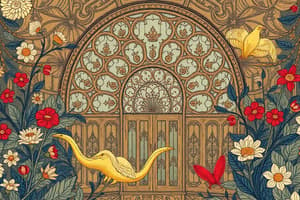Podcast
Questions and Answers
What does the term 'denotation' refer to?
What does the term 'denotation' refer to?
- The implied meaning of a word.
- The emotion evoked by a word.
- The cultural context of a word.
- The dictionary definition of a word. (correct)
Which of the following is an example of denotation?
Which of the following is an example of denotation?
- Describing a house as a 'home'.
- Defining 'quirk' as a peculiar trait. (correct)
- Saying someone is 'feeling blue'.
- Calling someone 'sluggish'.
Which of the following words has a connotation of warmth and belonging?
Which of the following words has a connotation of warmth and belonging?
- Home (correct)
- Dwelling
- Structure
- Residence
In the excerpt from The Adventures of Tom Sawyer, what does the narrator imply about Aunt Polly when describing her as 'simple-hearted'?
In the excerpt from The Adventures of Tom Sawyer, what does the narrator imply about Aunt Polly when describing her as 'simple-hearted'?
Flashcards
Denotation
Denotation
The literal or dictionary definition of a word.
Connotation
Connotation
The emotion or feeling evoked by a word, beyond its literal meaning.
Quirk (connotation)
Quirk (connotation)
A peculiar trait, often seen as cute or socially acceptable.
Dwelling (connotation)
Dwelling (connotation)
Signup and view all the flashcards
Simple-hearted (in context)
Simple-hearted (in context)
Signup and view all the flashcards
Study Notes
- Connotation and denotation are perspectives on the same word.
Denotation
- The dictionary definition or literal meaning of a word.
- The term originates from the Latin "denotationem," meaning "to note".
- Quirk: A peculiar trait.
- Oddity: An odd person, thing, event, or trait.
- Dwelling: A shelter in which people live.
- Home: One's place of residence.
Connotation
- The emotion or feeling evoked by a word, beyond its literal meaning.
- The term comes from the Latin "connotationem," meaning to "signify in addition to the main meaning."
- Shaped by the usage of the word.
- Quirk: A relatively positive connotation, perceived as cute or socially acceptable.
- Oddity: A more negative connotation, implying that the trait is less socially acceptable.
- Dwelling: A neutral or slightly negative connotation, feels like just a structure that is empty or cold.
- Home: A positive connotation, evokes warmth and belonging.
Connotation and Denotation in Literature
- Diction is a crucial tool for writers to convey meaning.
- Specific words evoke images and emotions, selected by the author for that purpose.
"The Bean Eaters" by Gwendolyn Brooks
- Creates imagery of an elderly couple content with their life.
- Touches on themes of aging, appreciating life's hardships and successes.
- Focuses on having what one needs versus what one wants.
- Twinklings: Connotation conjures images of something magical, almost mischievous, evokes nostalgia, memories that happened long ago and were over too quickly.
- Twinges: Connotation implies a recurring discomfort, but not unbearable pain, emphasizes that not all of their memories are pleasant and that they weathered hardships in their life together as well.
The Adventures of Tom Sawyer by Mark Twain
- Mark Twain used contrasting denotations and connotations in his writing.
- Twain describes Aunt Polly attempting to guide Tom into a confession of his mischief.
- Simple-hearted: Connotation shows her to be outmatched in wits or intelligence, a kind way of indicating that she is not particularly bright, but that she is kind.
- Transparent: Connotation suggests a failure to keep something hidden.
- Use of these terms encourages the reader to think of Aunt Polly as a kind but simple woman.
Studying That Suits You
Use AI to generate personalized quizzes and flashcards to suit your learning preferences.




